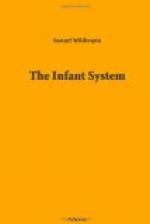It will, I trust, appear from what has been already said, that even from early childhood I both saw and felt that there was a period in human life, and that the most important period, as experience has proved to my full satisfaction, not legislated for, that is, not duly provided with suitable and appropriate methods of education. To see this was one thing, to provide a remedy for it and to invent plans for carrying out that remedy, was another. The systems of Bell and of Lancaster were then commencing operations, but were quite unsuitable for children under seven years of age at least, and therefore took little or no cognizance of that early period, which I had been inwardly convinced was of such eminent importance. I was destined for business, and served the usual apprenticeship to become qualified for it, and also continued in it for a short period on my own account. Even at this time the thought ever haunted me as to what should be done for young children. At length the germ was developed at one of the Sunday Schools, which were then rising into general notice. For years I attended one of these in London, and here circumstances again befriended me, regarding the matter so frequently in my thoughts. The teachers mostly preferred having a class to superintend that knew something, and I being then a junior, it fell to my lot to have a class that knew little or nothing. I mean nothing that it was the object of the Sunday-school to teach. It soon appeared clear to me, that such a class required different treatment to those more advanced, and especially the young children. Nobody wanted this class, it was always “to let,” if I did not take it. The result was, I always had it. Others looked to the post of honour, the Bible-class. I soon found that to talk to such children as I had to teach, in the manner the others did to the older and more advanced children, was useless, and thus I was forced to simplify my mode of teaching to suit their state of apprehension, and now and then even




